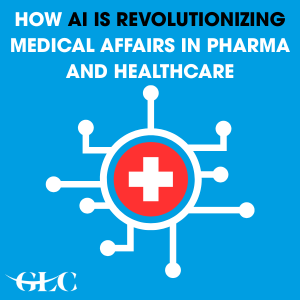Free knowledge to monitor the world of events. Have a look at our must read Blogs on Pharma, Finance, HR, Health and Cross Industry.
How AI is Revolutionizing Medical Affairs in Pharma and Healthcare
2022-08-16
The healthcare industry is experiencing a profound transformation, and at the heart of this evolution is Artificial Intelligence (AI).
The healthcare industry is experiencing a profound transformation, and at the heart of this evolution is Artificial Intelligence (AI). Among the many areas benefiting from this technological advancement, medical affairs is rapidly emerging as a key function being revolutionized by AI.
Medical affairs departments, historically responsible for bridging commercial strategy and clinical development, are currently employing AI to extend their scope, increase efficiency, and offer improved value to stakeholders.

What Is Medical Affairs?
Medical affairs is a significant position in pharmaceutical, biotechnology, and medical device companies. These teams offer scientific credibility for clinical data sharing, form HCP relationships, and facilitate safe and effective product usage.
The role is multi-faceted, involving:
- Management of medical queries and questions
- Collaboration with Key Opinion Leaders (KOLs)
- Support for clinical trials
- Preparation of educational material
- Post-market monitoring of safety and efficacy
The Role of AI in Modern Medical Affairs
AI introduces a new level of speed, precision, and insight to medical affairs functions. Heres how:
- Streamlining Medical Information Replies
Natural language processing (NLP) technology and AI-based chatbots can manage high volumes of medical questions accurately and consistently. These technologies can pull information out of intricate databases, ensuring timely and evidence-based answers to HCPs and patients.
- Data-Driven Insights driven by Real-World Evidence (RWE)
Medical affairs teams are called upon more frequently to interpret real-world data to demonstrate product value. AI algorithms can rapidly sort through large-scale data sets from electronic health records (EHRs) to social media messages to identify patterns, safety signals, and treatment effects that guide decision-making.
- Leveraging KOL Engagement
Artificial intelligence (AI) solutions support medical science liaisons in detecting and ordering the most impactful stakeholders within the scientific community and activity. Predictive analytics allows for personalizing KOL engagement activities by sensing the right experts at the right time with the right information.
- Medical Content Generation and Review
Natural Language Generation (NLG) allows for quicker creation of scientific literature summaries, slide presentations, and reports. Machine learning algorithms may assist the medical-legal-regulatory (MLR) review process by pointing out inconsistencies, unauthorized statements, or possible compliance problems.
- Ongoing Learning and Training
AI-based platforms can customize education programs for HCPs and MSLs according to learning patterns and knowledge needs. Adaptive learning systems provide users with current scientific information in an efficient manner.
Benefits of AI-Powered Medical Affairs
- Speed and Scale: Routine work automation allows teams to focus on higher-value activities.
- Accuracy and Consistency: AI ensures consistent, most recent information replies to queries.
- Strategic Decision-Making: Advanced analytics allow evidence-based plans and medical
strategies.
- Personalized Engagement: AI allows for personalized communication strategies with stakeholders.
Challenges and Considerations
While promising, the use of AI in medical affairs comes with some challenges:
- Data Privacy and Security: The processing of personal health data requires firm compliance with guidelines like GDPR and HIPAA.
- Human Oversight: AI can support but not replace human expertise. Final decisions have to be made by qualified professionals.
- Technology Adoption: Effective adoption involves training, infrastructure, and change management.
The Future: Human + AI
The future for Medical Affairs is not to man out with automation but to enhance human intelligence with artificial intelligence. AI acts as a strategic co-pilot that supports the judgment and capacity of medical experts with capabilities for insight generation, interaction, and decision-making support.
As pharmaceutical businesses become more open to AI-driven approaches, Medical Affairs will probably become an ever-more forward-thinking, data-driven, and value-creating function at the heart of healthcare innovation.
Conclusion
AI Medical Affairs is not a trend it's a revolution. From content creation to real-world evidence creation and strategic decision-making, AI enables medical teams to be more nimble, effective, and attuned to patient and healthcare provider needs. It will be essential for pharma companies to adapt to this shift to succeed in a competitive and rapidly evolving environment.
Do you want to understand more? Join our upcoming AI-powered Medical Affairs Masterclass.
By Shara Najimudeen, Digital Marketing Executive, GLC Europe, Colombo Office, Sri Lanka.
Get a feel for our events

Training Program for CMC Leaders - EU edition
14th September 2026 - 09th April 2027
Rich with practical insights and real-world applications
learn more >>
Training Program for CMC Leaders - US edition
14th September 2026 - 09th April 2027
Rich with practical insights and real-world applications
learn more >>
Advanced Stability Testing of Pharmaceuticals MasterClass - US edition
24-27 February, 2026
Increase the likelihood of studies receiving regulatory approval
learn more >>












